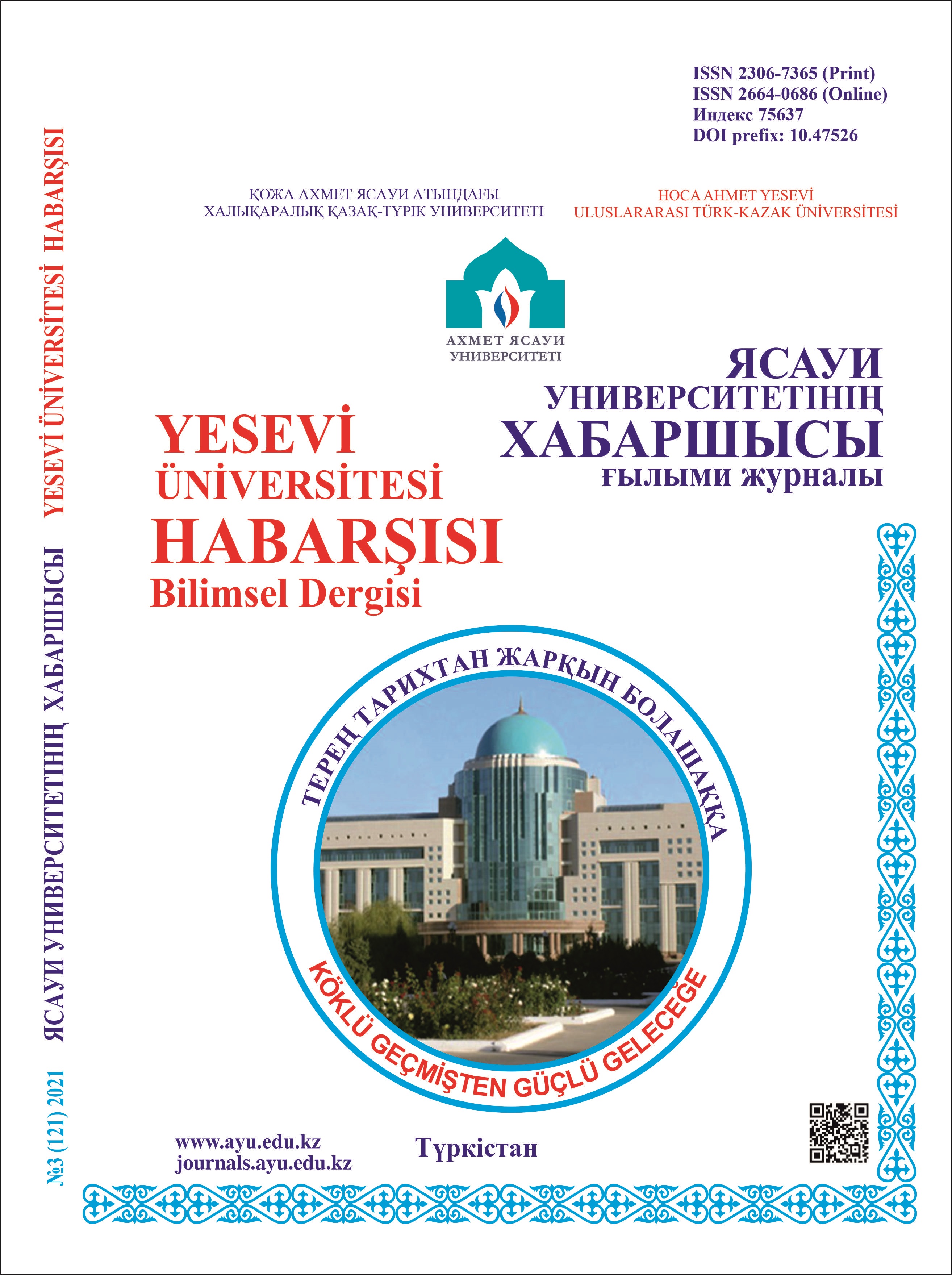Linguoculturological Character of Somatic Phraseological Units with the “Head” Component (based on Turkic (Kazakh, Tatar, Bashkir) and English)
Anahtar Kelimeler:
culture, traditions, language system, phraseology, term, idiom, phrase, Turkic languagesÖzet
The aim of the work is to be guided by the anthropological position of «the human factor in language» in the anthropocentric paradigm of modern scientific research, the study of the concept of «language is a constitutional property of a person» through language, the formation of a holistic theory and theoretical and methodological form of unity of «language and man, language and the world». In this regard, the main focus and significance of the article is to consider the language from the point of view of the «language code» through the triad «human studies – language – World Studies». The authors pay special attention to the vision and cognition of the world, understanding and perception of the world by the Kazakh, Tatar, Bashkir and English peoples, as well as to ensure that the world of images and standards, stereotypes and symbols in the context of cultural traditions is reflected in the language and fixed in the meaningful subtext of language units in the form of background knowledge. The article analyzes the somatic phraseology of the «head» component in the linguistic and cultural aspect. Through them, the similarities and identities of the representatives in the systems of figurative thinking, attempts to know the world, life experience, customs and consciousness are revealed and were used as the material of the article. The analysis of the content of phraseological units related to the triad «Humanity – Language – World Science» has been carried out. The article uses the method of comparing somatic phraseological units at the inter-lingual level.
The results of the study – in the semantic and substantive structure of somatic phraseology, presented in different languages, an archaic knowledge base is accumulated, which is caused by a person's self-awareness and the desire to thoroughly know other objects in the world through himself. The practical value of the work is the study of national and cultural features that contribute to the implementation of intercultural, interethnic communication between related and non-related languages.
In the conclusion of the work, the somatism «head» is divided into several categories. The phrases used in Turkic and English languages reveal a lot of similarities in the ways and semantic features of the word «head». In particular, if the similarities between the Turkic languages say that their tendency to exist is due to a common culture, the phraseology used in unrelated Turkic and English languages shows evidence that the function of the «head» in any people is to the same extent.
Referanslar
REFERENCES
Uraksin Z.G. Fraseologia bashkirskogo iazyka [Phraseology of the Bashkir language]. – Ufa: Nauka, 1975. – 123 s. [in Bashkir]
Avakova R. Frazemikadagy etnolingvistikalyq koncepsia [Ethnolinguistic concept in phrasemics]. – Almaty: Qazaq universiteti baspahanasy, 2013. 246 b. [in Kazakh]
Kenesbaev I. Qazaq tilinin frazeologialyq sozdigi [Kazakh language phraseological dictionary]. – Almaty: Gylym, 1977. ‒ 712 b. [in Kazakh]
Logan P. Smit. Frazeologiia angliiskogo iazyka [English Phraseology]/ Perevod A.S. Ignatieva. – M.: Gosudarstvennoe uchebno-pedagogicheskoe izdatelstvo ministerstva prosvesheniia RSFSR, 1959. – 207 c. [in Russian]
Bazarova D.H. Semantika naimenovanii chastei tela i proizvodnyh ot nih v tiurkskih iazykah [Semantics of names of body parts and their derivatives in the Turkic languages]: Avtoref. diss. ... kand. filol. nauk. – Tashkent, 1967. – 22 s. [in Russian]
Uyzbaeva D.K. Qazaq tilindegi somatikaliq etistikti frazeologizmderdin etnolingvistikalik sipaty [Ethnolinguistic character of semantic verb phraseology in the Kazakh language]: filol. gyl. kand. ... diss. avtoref. – Almaty, 1994. – 21 b. [in Kazakh]
Qaidarov A.T. Qazaq tilinin ozekti maseleleri [Actual problems of the Kazakh language]. – Almaty: Ana Tili, 1998. 304 b. [in Kazakh]
Smagulova G. Magynalas frazeologizmderdin ulttiq-madeni aspectileri [Natural-cultural aspects of the same meaning phraseology]. – Almaty: Gilim, 1998. – 196 b. [in Kazakh]
Safiullina F.S. Tatarcha-ruscha frazeologik suzlek [Tatar-Russian phraseology dictionary]. – Kazan: Magarif, 2001. – 335 b. [in Russian and Tatar]
Abubakirova Z.G. Somaticheskaia leksika v frazeologii bashkirskogo iazyka (linguokulturologicheskiy aspect) [Somatic vocabulary in the phraseology of the Bashkir language]: Diss. ... kand. filol. nauk. – Ufa, 2017. – 186 s. [in Russian]
Kenesbaeva U. Agilshinsha-qazaqsha frazeologialiq sozdik [English-Kazakh Dictionary of Idioms] – Astana: Parasat-kz, 2010. – 772 b. [in Kazakh and English]
Kunin A.V. Anglo-Ruskiy frazeologicheskiy slovar [English-Russian Dictionary of Idioms]. Izd. 3-e. ispr., v dvuh knigah. Kniga 1. – M.: Sov. Enciklopedia, 1967. – 1–738 s. [in English]
Kunin A.V. Anglo-Ruski fraseologicheski slovar [English-Russian Dictionary of Idioms]. Izd. 3-e. ispr., v dvuh knigah. Kniga 2. – M.: Sov. Enciklopedia, 1967. – 738–1265 s. [in English]
Gurevich V.V., Dozores J.A. Kratkiy russko-angliiskiy frazeologicheskiy slovar [Short Russian-English Phraseological Dictionary]. – M.: Russkiy iazyk, 1988. – 544 s. [in Russian and English]

